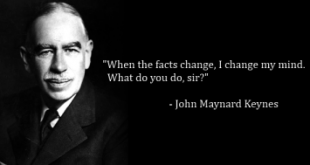He ain’t heavy, he’s my brother .[embedded content] In loving memory of my brother Peter. Twenty years have passed. People say time heals all wounds. I wish that was true. But some wounds never heal — you just learn to live with the scars. But in dreams, I can hear your name. And in dreams, We will meet again. When the seas and mountains fall And we come to end of days, In the dark I hear a call Calling me there I will go there And back again.
Read More »My favourite Italian teacher
My favourite Italian teacher .[embedded content]
Read More »How Richard Posner became a Keynesian
How Richard Posner became a Keynesian Until [2008], when the banking industry came crashing down and depression loomed for the first time in my lifetime, I had never thought to read The General Theory of Employment, Interest, and Money, despite my interest in economics … I had heard that it was a very difficult book and that the book had been refuted by Milton Friedman, though he admired Keynes’s earlier work on monetarism. I would not have been surprised...
Read More »Der Lügen-Präsident verlässt das Weiße Haus
Der Lügen-Präsident verlässt das Weiße Haus .[embedded content]
Read More »On the difference between econometrics and data science
On the difference between econometrics and data science .[embedded content] Causality in social sciences can never solely be a question of statistical inference. Causality entails more than predictability, and to really in depth explain social phenomena require theory. The analysis of variation can never in itself reveal how these variations are brought about. First when we are able to tie actions, processes or structures to the statistical relations...
Read More »Leontief’s devastating critique of econom(etr)ics
Leontief’s devastating critique of econom(etr)ics Much of current academic teaching and research has been criticized for its lack of relevance, that is, of immediate practical impact … I submit that the consistently indifferent performance in practical applications is in fact a symptom of a fundamental imbalance in the present state of our discipline. The weak and all too slowly growing empirical foundation clearly cannot support the proliferating...
Read More »Skolval och segregation
Vi undersöker hur skolsegregationen rent hypotetiskt skulle ha utvecklats om alla elever gått i den närmsta kommunala skolan, och inte haft möjlighet att välja skola. I figuren visas denna utveckling med den svarta linjen. I början av 1990-talet gick nästan alla elever i den närmsta skolan och därför är skillnaden mellan verklig skolsegregation (blå linje) och hypotetisk skolsegregation (svart linje) inte så stor. Utvecklingen av den svarta linjen visar att skolsegregationen...
Read More »Ulf Kristersson har helt rätt
Ulf Kristersson har helt rätt Moderaterna kräver idag att regeringen ökar trycket på att personal som arbetar inom vården eller med riskgrupper vaccinerar sig mot covid 19. De som avstår från att vaccinera sig bör överväga att byta anställning eller omplaceras, skriver Moderaterna i ett pressmeddelande. Det är sällan man har anledning hålla med den moderate partiledaren, men här har han för en gångs skull klockrent rätt!
Read More »Fooled by randomness
A non-trivial part of teaching statistics to social science students is made up of teaching them to perform significance testing. A problem yours truly has noticed repeatedly over the years, however, is that no matter how careful you try to be in explicating what the probabilities generated by these statistical tests — p-values — really are, still most students misinterpret them. A couple of years ago I gave a statistics course for the Swedish National Research School in...
Read More »My favourite French teacher
My favourite French teacher .[embedded content]
Read More » Lars P. Syll
Lars P. Syll





